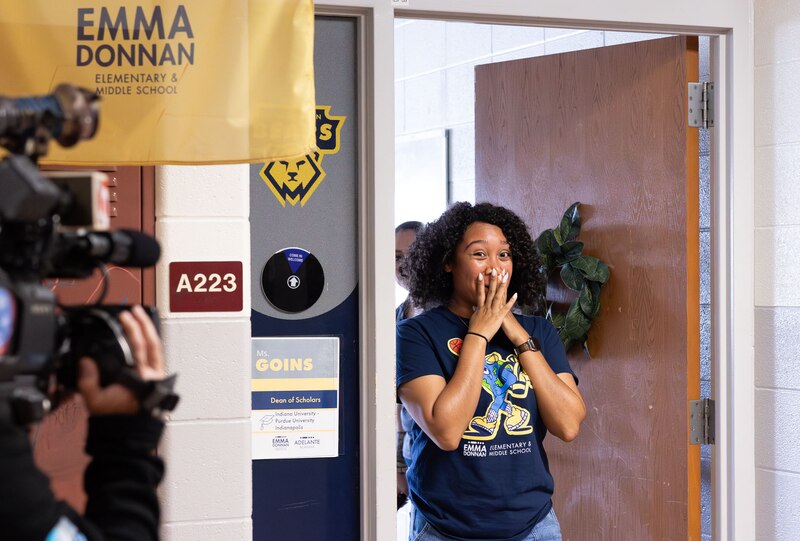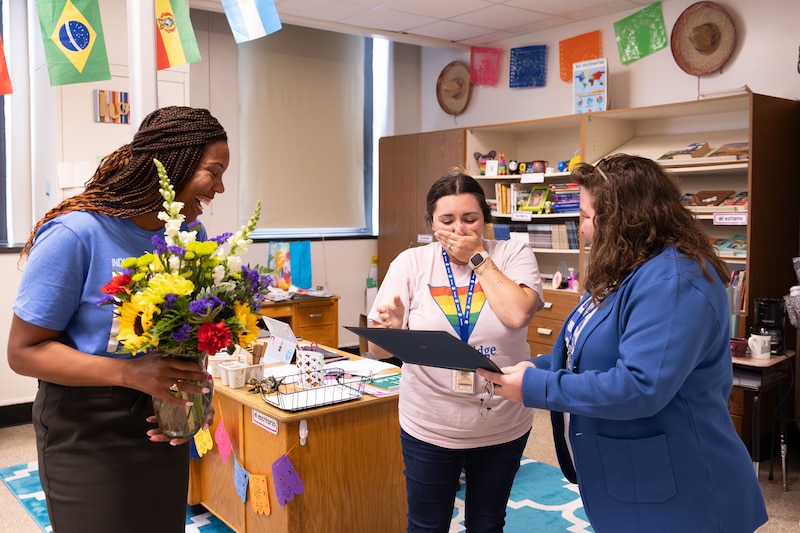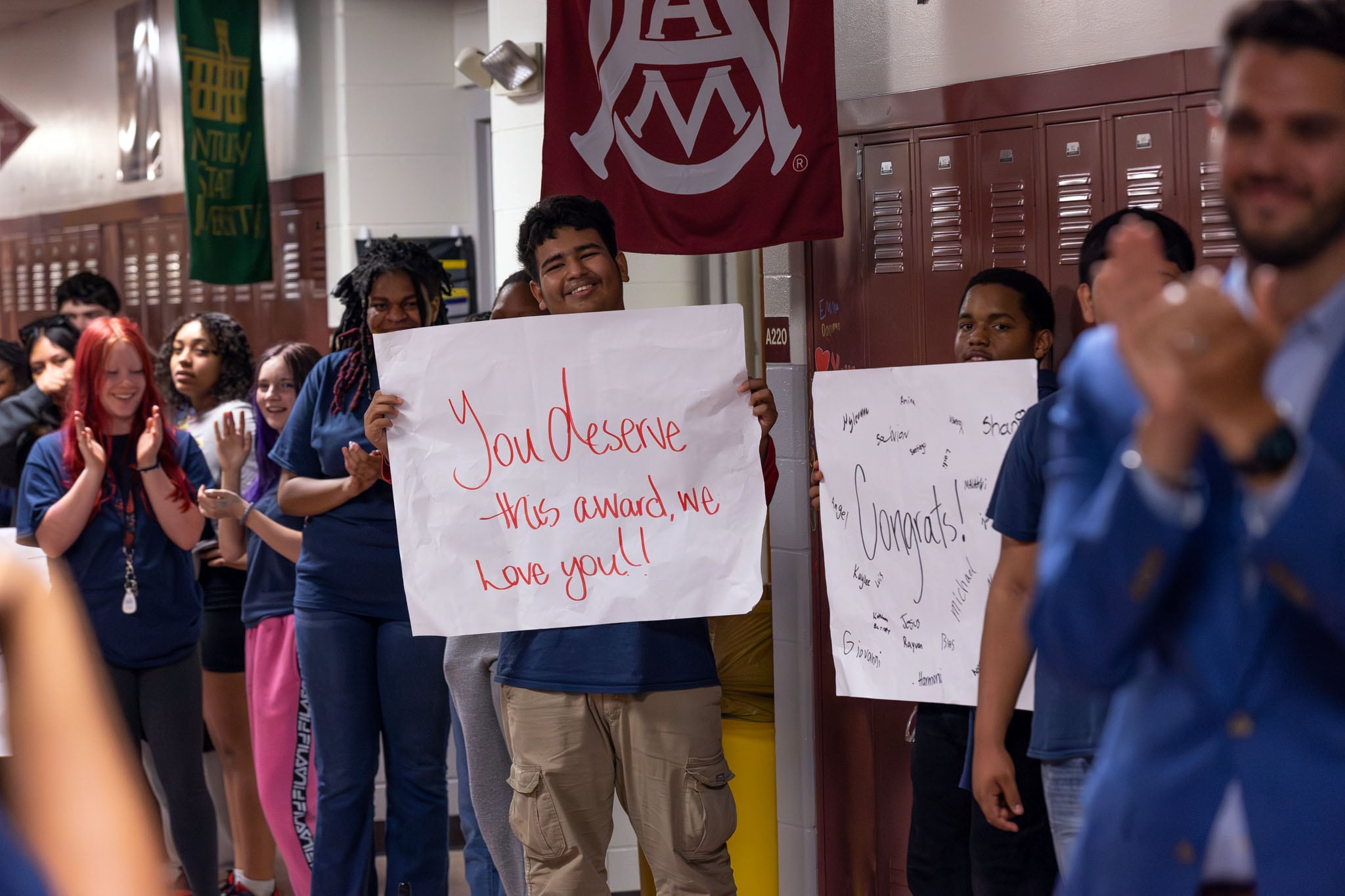Sign up for Chalkbeat Indiana’s free daily newsletter to keep up with Indianapolis Public Schools, Marion County’s township districts, and statewide education news.
Typically, eighth graders aren’t great at keeping secrets.
But when it came to surprising their teacher Ashley Hogan with her Teacher of the Year award, she said they made it happen and it was a complete shock.
Last month, Indianapolis Public Schools made announcements for its 2025 Teachers of the Year: Hogan of Emma Donnan Elementary and Middle School and Linda Thomson of Shortridge High School.
The annual award goes to one educator at the elementary level and one at the secondary level. They are nominated by principals and selected by a committee of peers, per IPS.
Below, Hogan and Thomson answered questions from Chalkbeat about their teaching inspirations, using multiple languages in the classroom, and how to spend summer break.
These interviews have been lightly edited for clarity and length.
A family of educators and personal classroom experiences
Hogan teaches eighth grade English language arts at Emma Donnan, which is part of Adelante Schools and an IPS innovation school.

How and when did you decide to become a teacher?
Honestly, third grade was the year that I knew education was the path I wanted. My father, mother, and grandmother were all educators. I grew up around kids, and felt like it was my calling.
I started in early education because those early years are most important and foundational. I became an eighth grade teacher two years ago because I wanted a challenge. I found that my students didn’t have that early foundation year, so I ended up incorporating those foundation skills from teaching younger students.
How do you use your own experience with an Individualized Education Program to empower your students?
I struggled with math growing up and had an IEP. The toolset I gained from that are the strategies that I use in my classroom now. I tell my scholars that everyone is different and all the strategies aren’t going to work for everyone.
I also tell them that I understand that at times things are going to be difficult, so growth is a win. If I made small progress in my math skills, my family would praise me so I give that same praise to my students.
How do you use being multilingual in the classroom?
I am fluent in Spanish and professionally fluent in French after learning as a student at the International School of Indiana and kept going in college.
For the last two years, I’ve had classes that are a mix of English and Spanish speakers, so I teach in Spanish and English and it helps students who are Spanish speakers to have more confidence. Little by little they have more confidence to answer questions in English too.
What’s your favorite lesson to teach and why?
I have two. The first unit of the year allows my scholars to write poetry and read it in the classroom. They gain confidence and the other scholars are in their seats encouraging them. I immediately saw their confidence in public speaking increase.
And second is a Shakespearean unit. You can see them make the effort to read aloud and try out the tone and be confident. They want to be Puck and say the lines and try it out.
What is your advice to students on how to spend the summer?
Enjoy the summer. The school year is when they have to be locked in and focused and engaged. But in the summer, they can go outside, put down the phones, get away from the TV and try something new.
My eighth graders last year who did that felt better and more confident in themselves in the new high school year so I want the same for this group that just ended the year.
From the dance studio to Shortridge Spanish class
Thomson teaches Spanish and is a World Language Department Lead at Shortridge.

How and when did you decide to become a teacher?
I have always known I wanted to be a teacher: I was that kid who had a chalkboard and would sit my dolls around my room and give them spelling tests.
I am so passionate about my heritage and sharing my love of the language with others, so teaching Spanish was an obvious choice for me. More than anything, I love helping others, and being a teacher is a great opportunity to do just that.
What was your experience with school and how does it influence you today?
I had really great teachers, especially in high school. My teachers allowed us to be creative and gave us a space where we would feel comfortable asking questions and expressing our opinions.
Teachers who pushed me to do more than the bare minimum in my classes because they knew I was capable of more. I strive to be that same positive influence on my students as well, pushing them to see what more they can achieve.
Similarly, how does growing up in a bilingual household impact your work?
On my mom’s side, I was the first person to graduate high school, then college. Everything I do I ask myself: “How can I make my family proud?” In the classroom, I talk about my experiences growing up, and can relate to my students who have also had to grow up being the family’s translator.
It is more than just teaching a second language for me. It is about inspiring my students to explore the world. I just had a former student spend a semester in Spain and another recently switched her major to Spanish education. When students share those experiences with me, it’s pretty special.
Before teaching at Shortridge, you owned a dance studio. What did that experience teach you about inspiring students?
It taught me how hard work can truly pay off. At the end of the season we would put on a big dance recital. Organizing that show for so many students was a lot of work.
The most rewarding time happened when it was all done — when the students could look back and realize that they overcame the fear that comes with performing on a stage. Showing the students everything they can do by working together and positively supporting each other is something that I love to see, even if my teaching environment has changed from a studio to a classroom.
What is your advice to students on how to spend the summer?
Students should spend their summers doing what makes them happy, but also be willing to try new things. This is your opportunity to learn a new skill or explore a new place!
Find a cool book to read, find new music or an interesting podcast to listen to, etc. You can start a new job, which is one of the best ways to meet new people or finish up that craft project you didn’t have time for during the school year.
MJ Slaby oversees Chalkbeat Indiana’s coverage as bureau chief. She also covers access to higher education and Warren Township Schools. Contact MJ at mslaby@chalkbeat.org.




